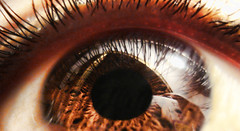A condition resembling Keratoconus is virtually always caused by refractive eye surgery, specifically LASIK. After LASIK, the cornea has been made thinner. Because the corneal “wall” has been made thinner, internal pressure from within the eye can cause expansion or distension of the cornea. The resultant distorted corneal surface will usually make it impossible to have clear vision with eyeglasses or soft contact lenses. Most of the time a special gas permeable contact or scleral lens will be needed to restore lost vision. These special high tech lenses (which have only recently become available) will act to create a new corneal surface allowing the patient to regain clear, comfortable vision.
Post Lasik Treatments:
There are a number of specialized lenses now available that will allow post-surgical patients to function on a much higher level and with a much greater level of comfort. To address the vision and comfort issues that most post-refractive surgical patients are facing, Dr. Azman prescribes Post-Surgical Scleral Lenses.
Scleral contacts are large-diameter gas permeable contact lenses specially designed to vault over the entire corneal surface and rest on the “white” of the eye (sclera). In doing so, scleral lenses functionally replace the irregular cornea with a perfectly smooth optical surface to correct vision problems caused by Lasik failures, post-surgical complications, and other corneal irregularities.
Because scleral lenses are designed to vault the corneal surface and rest on the less sensitive surface of the sclera, these lenses often are more comfortable for a person with corneal irregularities. A special liquid fills the space between the back surface of the lens and the front surface of the cornea. This liquid acts as a buffer and protects the compromised corneal tissue. Scleral lenses are designed to fit with little or no lens movement during blinks, making them more stable on the eye, compared with traditional corneal gas permeable lenses. These lenses are almost always very comfortable and the vision provided by them is extremely good. The great majority of patients are able to wear their scleral lenses almost all of their waking hours without problems.
Dr. Irwin Azman prescribes scleral contact lenses for a variety of hard-to-fit eyes, including patients with Stevens-Johnson Syndrome, Radial Keratotomy and Lasik Complications, Keratoconus, Corneal Ectasia, Post-Surgical Vision Loss, and Pellucid Marginal Degeneration.
Dr. Irwin Azman neither avoids nor declines the challenge of prescribing the most difficult cases. Dr. Azman tends to have a perfectionist demeanor.
